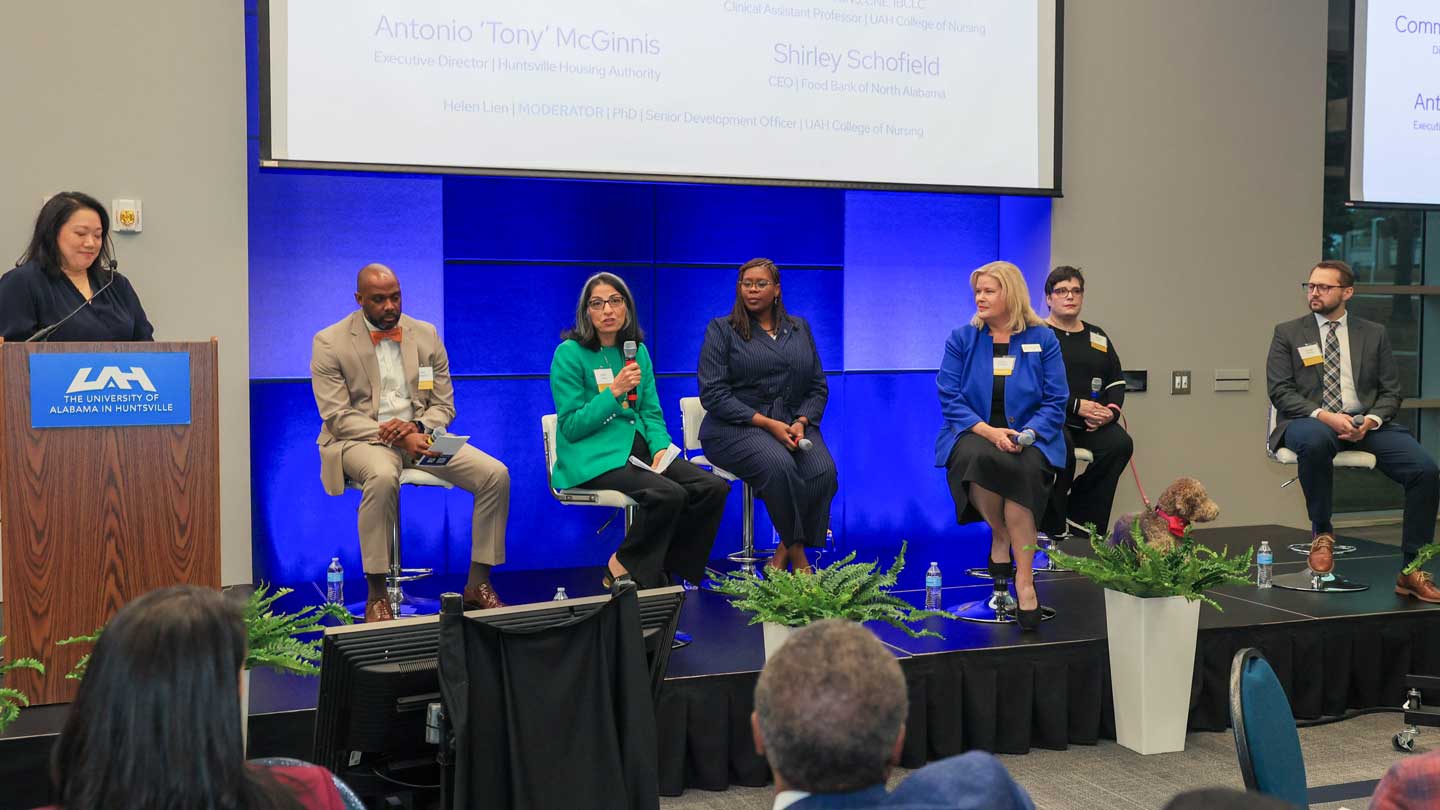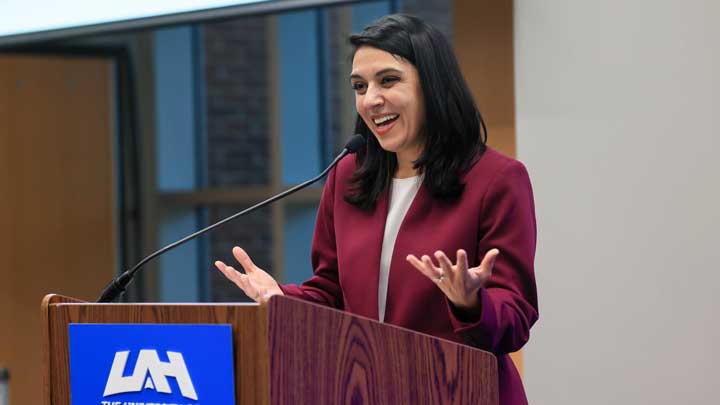
Panelists from the College of Nursing at The University of Alabama in Huntsville (UAH) and their community partners in the college’s new Neighborhood Nursing initiative discuss the program during SHINE 2025, the second annual Symposium for Health Innovation and Neighborhood Engagement, Oct. 21, 2025, on the UAH campus. From left, they are Dr. Helen Lien, Nursing senior development officer; Antonio McGinnis, executive director, Huntsville Housing Authority; Dr. Azita Amiri, Nursing associate dean of research; Madison County Commissioner Violet Edwards; Shirley Schofield, CEO, Food Bank of North Alabama; Dr. Melissa Foster, Nursing clinical assistant professor, and Morgan Dennis, vice president of the Cardiovascular Service Line and the Heart Center at Huntsville Hospital Health System.
Michael Mercier | UAH
Alabama’s health landscape is bleak: third worst in the nation in longevity, second worst in veteran suicide rates and infant outcomes, and the very worst in maternal outcomes. But health care professionals don’t quit when facing hard problems. They find good solutions.
Enter Neighborhood Nursing, a new multi-agency initiative developed by the College of Nursing at The University of Alabama in Huntsville (UAH), a part of The University of Alabama System. The college introduced this program, the first of its kind in the nation, along with several of its community partners during SHINE 2025, the second annual Symposium for Health Innovation and Neighborhood Engagement, on Oct. 21 on the UAH campus.

Dr. Tisamarie Sherry, vice president of the Health Policy Division at the Urban Institute, was the keynote speaker for SHINE 2025 at The University of Alabama in Huntsville (UAH) Oct. 21.
Michael Mercier | UAH
SHINE showcased the scope of Neighborhood Nursing through a series of panel discussions that described innovative features of the program and explored major health care issues being addressed. The event also featured keynote speaker Dr. Tisamarie Sherry, vice president of the Health Policy Division at the Urban Institute.
Dr. Karen Frith, College of Nursing dean and professor, pointed out that SHINE has grown from roughly 80 attendees at the inaugural event in 2024 to a sold-out audience of more than 200 in 2025.
“Our college mission is to educate and inspire visionary nurse leaders who can act with integrity, discover through science and champion strategies that promote health and well-being in Alabama, the nation and beyond,” she said.
Creating a collaborative health model
Dr. Helen Lien, who serves the college as senior development officer, laid out the state’s health care challenges and outlined the Neighborhood Nursing mission: “to improve health care access, reduce disparities and help people live longer, healthier lives by bringing together local leaders, health care professionals and community stakeholders.”
The program aims to target old problems in a new way to improve conditions in Alabama and beyond.
“We envision a regional, multi-agency collaborative that is recognized as a national leader in community-based, data-driven health care, where the College of Nursing at UAH serves as the primary principal academic partner.”
Taking health care to the people
Neighborhood Nursing will roll out several components over the next few months and years. Most are new, such as the External Advisory Board launching in November and a podcast slated to start in spring 2026. Others come with long-proven track records: Let’s Pretend Hospital, introducing local first graders to health care environments since 1985.
Perhaps the most exciting new program in the mix is also its most innovative: onsite health screenings that also bring primary preventive care to rural and underserved communities that incorporate required student clinical hours.
Inspired by Johns Hopkins University’s Neighborhood Nursing and Costa Rica’s world-renowned, community-based, preventive health care model, Neighborhood Nursing at UAH is a pioneering and groundbreaking program.
“Once again, the UAH College of Nursing, in collaboration with our community partners, is launching a program that is a first of its kind in the nation,” Lien said. “Neighbors will work their way through different stations, starting with free screenings. Then the neighbor is directed to an onsite provider, if follow-up is needed, without ever having to leave their neighborhood.”
She highlighted College of Nursing faculty who have been “the backbone of our Neighborhood Nursing”: Dr. Melissa Foster, Dr. Laura Graham, Dr. Shikha Modi, Dr. Michele Kane, Dr. Darlene Showalter and Dr. Misty Smith. “Your dedication ensures this movement is sustainable, scalable and grounded in what works.
Lien offered special thanks to Dr. Azita Amiri: “Your visionary leadership as the associate dean of research and your deep commitment to public health and community advocacy brought this transformative concept to the College of Nursing.”
Along with her roles at UAH, Amiri is a fellow of the Bloomberg School of Public Health at Johns Hopkins University and also serves as a member of the Alabama Legislature’s Longevity Task Force.
Neighborhood Nursing’s first onsite health screening event is set for January 2026. Stage One pilot sites include the Robert “Bob” Harrison Senior Wellness and Advocacy Center, the Town of Triana and Huntsville Housing Authority neighborhoods Brookside and Northwoods. Stage Two moves into counties adjacent to Madison County in fall 2026. Stage Three expands across North Alabama in spring 2027.
“In Stage Four,” Lien said, “we anticipate delivering a comprehensive implementation framework, a Neighborhood Nursing blueprint, that can be deployed by other colleges and schools of nursing across the state.”
Learning from others’ experiences
Lien moderated SHINE’s opening panel, which further explained the work that’s gone into the creation of Neighborhood Nursing as well as the program’s early reception and what lies ahead.
“We are drawing inspirations from places like Costa Rica,” Amiri said, “where their community-engaged health system has allowed them to achieve one of the highest life expectancies in the world. We are also learning from Baltimore, which started something similar, sending their nurses into the neighborhoods. We are in collaboration with both places.”
Madison County Commissioner Violet Edwards pointed out that Neighborhood Nursing is boosting the already successful efforts to revitalize the Bob Harrison Center in the wake of the COVID-19 closure. They started by opening the center for COVID testing and vaccinations and grew membership to more than 600 today by listening to people’s concerns and incorporating health and wellness programming.
Now, she said, “We’re excited to be a part of this.”
Antonio L. McGinnis, executive director of the Huntsville Housing Authority, noted the strong philosophical connection between the missions of his agency and Neighborhood Nursing:
“Oftentimes our residents are overlooked. They don’t have an opportunity to be at the table. And oftentimes, they’re reactive with their health. This will give us an opportunity to encourage our residents to be proactive. It falls in line with us trying to help our residents be more self-sufficient because, if you’re more self-sufficient, you can go out and obtain a livable-wage job. We’re hoping that this will provide a holistic approach to the residents that we serve.”
The panel also included Morgan Dennis, vice president of the Cardiovascular Service Line and the Heart Center at Huntsville Hospital Health System, and Shirley Schofield, chief executive officer of the Food Bank of North Alabama.
Reaching out to communities
In her keynote address, Sherry emphasized the power of communities.
“There is no better time for the people in this room to be gathering together to think about our path forward. How do we use the strengths that we have locally in order to deliver and to serve communities better and to support our neighbors? I firmly believe that communities can lead – not just continue to serve as they have been doing but also to teach the rest of us how to do better and how to effectuate broader policy change through innovation and partnerships.”
The four afternoon panels covered maternal and infant health, veterans’ health, mental health and the use of artificial intelligence (AI) in health care. Panelists included Alabama legislators Laura Hall and Marilyn Lands, retired Maj. Gen. Paulette Risher of the Alabama Challenge for the Prevention of Veteran Suicide, Jeremy Blair of WellStone, and Dr. Larry Lowe, chief innovation officer for the City of Huntsville.
Amiri noted earlier in the program that Neighborhood Nursing is already working with 23 collaborators, but there’s plenty of room at the table. For more information on Neighborhood Nursing or to explore partnership opportunities, contact her at aa0033@uah.edu.